
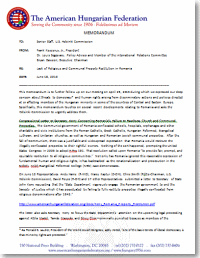 |
| [download] AHF's follow up letter to the Helsinki Commission regarding Church Property Restitution in Romania. |
6/19/2013 - AHF submits memorandum to US Helsinki Commission in follow up to the Congressional letter to Secretary John Kerry requesting that the “State Department vigorously engage the Romanian government to end the travesty of justice which it has perpetuated by failing to fully restitute properties illegally confiscated from religious denominations after 1945" and AHF's April 25 meeting with the Commission during which AHF expressed its deep concern about threats to democracy and human rights arising from discriminatory actions and policies affecting members of the Hungarian minority in some of the countries of Central and Eastern Europe.
The full text of the AHF Memorandum is below:
MEMORANDUM
| TO: |
Senior Staff, U.S. Helsinki Commission |
| FROM: |
Frank Koszorus, Jr., President,
Dr. Louis Segesvary, Policy Adviser and Member of the International Relations Committee,
Bryan Dawson, Executive Chairman |
| RE: |
Lack of Religious and Communal Property Restitution in Romania |
| DATE: |
June 18, 2013 |
_____________________________________________________________________
This memorandum is to further follow up on our meeting on April 25, 2013 during which we expressed our deep concern about threats to democracy* and human rights arising from discriminatory actions and policies directed at or affecting members of the Hungarian minority in some of the countries of Central and Eastern Europe. Specifically, this memorandum touches on several recent developments relating to Romania and asks the Helsinki Commission to urgently address them.
Congressional Letter to Secretary Kerry Concerning Romania’s Failure to Restitute Church and Communal Properties. The Communist government of Romania confiscated schools, hospitals, orphanages and other charitable and civic institutions from the Roman Catholic, Greek Catholic, Hungarian Reformed, Evangelical Lutheran, and Unitarian churches, as well as Hungarian and Romanian Jewish communal properties. After the fall of Communism, there was a justifiable and wide-spread expectation that Romania would restitute the illegally confiscated properties to their rightful owners. Nothing of the sort happened, prompting the United States Congress in 2005 to adopt H.Res 191. That resolution called upon Romania “to provide fair, prompt, and equitable restitution to all religious communities.” Not only has Romania ignored this reasonable expression of fundamental human and religious rights, it has backtracked as the renationalization and prosecution in the Székely Mikó Evangelical Reformed College (MEC) case demonstrates.
On June 13 Representatives Andy Harris (R-MD), Marcy Kaptur (D-OH), Chris Smith (R)(Co-Chairman, U.S. Helsinki Commission), David Royce (R-OH) and 17 other Representatives submitted a letter to Secretary of State John Kerry requesting that the “State Department vigorously engage the Romanian government to end the travesty of justice which it has perpetuated by failing to fully restitute properties illegally confiscated from religious denominations after 1945.”
Kerry_Romania_Property_Restitution.pdf
The letter also asks Secretary Kerry to focus the State Department’s attention on the upcoming legal proceeding against Attila Markó, Tamás Marosán and Silviu Clim—criminally punished because as members of the official Romanian Property Restitution Committee they restored the Székely Mikó Reformed High School in Sepsiszentgyörgy/Sfantu Gheorghe to the Hungarian Reformed Church.
AHF_Statement_Miko_Helsinki.pdf
We would like to reiterate and urge the Helsinki Commission to publicly and privately raise this case** before June 27 as well as the need for the equitable, prompt and fair restitution of religious and communal properties, including archival material.
Redistricting Administrative Units Would Further Reduce the Ability of Hungarians to Effectively Participate in Public Affairs. Hungarians constitute a majority of the population in a number of counties in Romania, a multi-ethnic and multi-cultural state where an estimated twenty percent of the population is ethnically non-Romanian.
Under the guise of regionalization, the Ponta regime is preparing to deprive the Hungarian regions of self-administration by incorporating the Hungarian majority regions into newly created subdivisions with Romanian majorities. This would deprive the Hungarians of local administration and cultural autonomy. Significantly, a recent poll across all of Romania showed that Romanians are opposed to the new regionalization.
During the Communist dictatorship, Ceausescu did the same thing, when by a stroke of a pen, he abolished the Hungarian Autonomous Region. His stated objective was “homogenization”. The current administration is emulating the past by depriving minorities of regional and cultural autonomy. While in the European Union there are several autonomous regions, Romania refuses to even consider according any kind of autonomy to the Hungarian minority despite continuous requests. Regionalization is nothing but cover for forced assimilation, an official anti-minority and anti-Hungarian phenomenon that should also be raised by the Helsinki Commission.
_______________________
* As Ronald S. Lauder, President of the World Jewish Congress, aptly noted, "one of the basic tenets of liberal democracy is that minority rights are protected.”
** The college was built by contributions and owned and operated since 1859 by the Reformed Church until its seizure. Thereafter it was used by the Romanian state for its own purpose. In addition, the Communist regime 'sold' the flats that are part of the college and formerly used by the teaching faculty. In May 2002, the property was duly restituted to the Reformed Church. Romania thereafter sued for the nullification of the restitution (thereby seeking to re-nationalize it), monetary damages from the Reformed Church and the imposition of severe criminal penalties for the officials who had ruled in favor of the restitution. The evidence appeared to be unassailable that MEC belonged to the Reformed Church in 1948 when it was illegally nationalized. Moreover, the officials of Sfantu-Gheorghe, e.g., members of the city council and mayor, testified in the pending proceeding in support of the legality of the restitution of MEC to the Reformed Church.
Nevertheless at the conclusion of the first stage of the proceeding on June 29, 2012, the three individual defendants received three year prison sentences (Vlim’s sentence being suspended), the Reformed Church was ordered to pay 1M lei, and the property was re-nationalized. The Hungarian community justifiably views this case not only as a property restitution case but also as a proceeding directed against the community and a manifestation of intolerance and discrimination. At a minimum it violates the rule of law and Western values and norms.
[<< back to AHF news from Rumania] |
[<< Back to Property Restitution]
[<< Back to News from Rumania] Church Property Restitution Summary
While the majority of ethnic Romanians belong to the Orthodox Church, a significant minority belong to the Greek Catholic Church, which was forcibly dissolved by the Communist government in 1948. Members of 1.5-million strong Hungarian minority are mostly affiliated with the Roman Catholic, Hungarian Reformed, Lutheran, and Unitarian denominations. Confiscations of Jewish property by the wartime Fascist governments were also upheld by the Communist government. Hundreds of thousands of claims have been made, but the Romanian government continues to drag its feet at resolving property disputes involving the Hungarian minority. In fact, Romania is reversing lawful church property restitution, through criminal prosecution.
In its statement from July, 2012, AHF expressed its deep concern regarding the prosecution of former state secretary Attila Marko, Silviu Vlim and Tamas Marosan in connection with the restitution to the Reformed Diocese of Transylvania of the Szekely Miko Evangelical Reformed College (“MEC”), a baseless and blatant attempt by Romanian authorities to further stall and reverse the lawful restitution of church properties seized by the communists.
Restitution of property confiscated by the Communist regime in Romania is a process meant to compensate for crimes committed against national communities and their property rights, against individuals and against a value system in which the right of property is sacred. The restitution of confiscated land, forests, church-buildings and of other real-estate owned by the community is a primary goal for every religious and ethnic community in Romania. The establishment of a legal framework for this restitution has proved to be a very challenging process. The restitution process in Romania is far from complete, it is characterized by contradictions and efforts at advancing this process are fraught with obstacles on a daily basis.
The restitution of confiscated community property, including those owned by the historical Hungarian churches is indispensable for this community, in its struggle to keep its national identity. Restitution is also indispensable for this community to have its independent establishments and for its present and future viability as a community.
Selected Related Articles
  Egyházi javak visszaszolgáltatása – Küzdelem minden négyzetcentiméterért – AUDIÓ Egyházi javak visszaszolgáltatása – Küzdelem minden négyzetcentiméterért – AUDIÓ
A Kossuth Rádió munkatársának Berek Patriciának az Amerika Magyar Szövetség elnöke, Koszorús Ferenc elmondta: a Szövetség már többször felhívta az Egyesült Államok Kongresszusának és a Helsinki Bizottságnak a figyelmét arra, hogy Romániában a magyar egyházi tulajdonok visszaszolgáltatása nagyon lassan halad. Az Amerikai Magyarok Szövetségének elnöke azt is kifejtette, hogy a Helsinki Bizottságban felvetették, hogy Románia közigazgatási újrafelosztása is hátrányosan érintheti az erdélyi magyarságot.Romániában az egyházak több mint húsz év óta próbálják visz- szaszerezni a kommunizmus alatt elkobzott ingatlanjaikat és egyéb javaikat. Gyakorlatilag minden egyes négyzetcentiméterért meg kell küzdeniük. [tovább]
 Utoljára Ceausescu tett ilyet a magyarokkal: Utoljára Ceausescu tett ilyet a magyarokkal:
Az amerikai Helsinki Bizottságtól várnak megoldást a romániai magyarok helyzetére Amerikában élő magyarok. Levelükben aggodalmukat fejezték ki a romániai közigazgatás újrafelosztása miatt is. Az Amerikai Magyar Szövetség (AMSZ) kedden feljegyzésben szólította fel ismételten az amerikai Helsinki Bizottságot, hogy június 27-ig "nyilvánosan és bizalmasan is vesse fel" a romániai egyházi és közösségi javak, beleértve a levéltárak igazságos és azonnali visszaszolgáltatásának kérdését. [tovább]
 6/19/2013 - Kiállást vár az amerikai Helsinki Bizottságtól az Amerikai Magyar Szövetség: Az Amerikai Magyar Szövetség feljegyzésben szólította fel ismételten a szervezetet, hogy június 27-ig "nyilvánosan és bizalmasan is vesse fel" a romániai egyházi és közösségi javak, beleértve a levéltárak igazságos és azonnali visszaszolgáltatásának kérdését. [tovább] 6/19/2013 - Kiállást vár az amerikai Helsinki Bizottságtól az Amerikai Magyar Szövetség: Az Amerikai Magyar Szövetség feljegyzésben szólította fel ismételten a szervezetet, hogy június 27-ig "nyilvánosan és bizalmasan is vesse fel" a romániai egyházi és közösségi javak, beleértve a levéltárak igazságos és azonnali visszaszolgáltatásának kérdését. [tovább]
---
 6/19/2013 - Kiállást vár az amerikai Helsinki Bizottságtól az Amerikai Magyar Szövetség: Az Amerikai Magyar Szövetség feljegyzésben szólította fel ismételten a szervezetet, hogy június 27-ig "nyilvánosan és bizalmasan is vesse fel" a romániai egyházi és közösségi javak, beleértve a levéltárak igazságos és azonnali visszaszolgáltatásának kérdését. [tovább] 6/19/2013 - Kiállást vár az amerikai Helsinki Bizottságtól az Amerikai Magyar Szövetség: Az Amerikai Magyar Szövetség feljegyzésben szólította fel ismételten a szervezetet, hogy június 27-ig "nyilvánosan és bizalmasan is vesse fel" a romániai egyházi és közösségi javak, beleértve a levéltárak igazságos és azonnali visszaszolgáltatásának kérdését. [tovább]
---
 6/14/2013 - US Congressmen press for return of church property from Romanian gov’t:
Twenty US congressmen turned to Secretary of State John Kerry urging him to put pressure on the Romanian government to restitute Hungarian church property confiscated after 1945. The letter signed by US representatives including Ileana Ros-Lehtinen, the chair of the committee for foreign affairs, and Christopher Smith, co-chairman of the US Helsinki Committee, said illegally confiscated religious institutions should be immediately returned in a fair and equitable manner. [read more] 6/14/2013 - US Congressmen press for return of church property from Romanian gov’t:
Twenty US congressmen turned to Secretary of State John Kerry urging him to put pressure on the Romanian government to restitute Hungarian church property confiscated after 1945. The letter signed by US representatives including Ileana Ros-Lehtinen, the chair of the committee for foreign affairs, and Christopher Smith, co-chairman of the US Helsinki Committee, said illegally confiscated religious institutions should be immediately returned in a fair and equitable manner. [read more]
---
 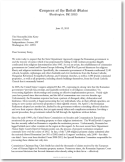 6/14/2013 - Representatives Andy Harris (R-MD), Marcy Kaptur (D-OH), Chris Smith (R-NJ) and David Royce (R-OH) and 17 other Representatives submitted a letter to Secretary of State John Kerry requesting that the “State Department vigorously engage the Romanian government to end the travesty of justice which it has perpetuated by failing to fully restitute properties illegally confiscated from religious denominations after 1945.” The letter also asks Secretary Kerry to focus the State Department’s attention on the upcoming legal proceeding against Attila Markó, Tamás Marosán and Silviu Clim. [read more] 6/14/2013 - Representatives Andy Harris (R-MD), Marcy Kaptur (D-OH), Chris Smith (R-NJ) and David Royce (R-OH) and 17 other Representatives submitted a letter to Secretary of State John Kerry requesting that the “State Department vigorously engage the Romanian government to end the travesty of justice which it has perpetuated by failing to fully restitute properties illegally confiscated from religious denominations after 1945.” The letter also asks Secretary Kerry to focus the State Department’s attention on the upcoming legal proceeding against Attila Markó, Tamás Marosán and Silviu Clim. [read more]
---
 3/19/2013 -- United States Helsinki Commission holds Hearing entitled, "The Trajectory of Democracy – Why Hungary Matters" to "examine Hungary’s constitutional changes with a particular view to the independence of the judiciary, present-day Hungary’s relationship to its Holocaust-era past, and the implications of Hungary’s sweeping legal changes for civil society, including an independent media and religious organizations." AMERICAN HUNGARIAN FEDERATION TESTIMONY ENTERED INTO RECORD. [read more] 3/19/2013 -- United States Helsinki Commission holds Hearing entitled, "The Trajectory of Democracy – Why Hungary Matters" to "examine Hungary’s constitutional changes with a particular view to the independence of the judiciary, present-day Hungary’s relationship to its Holocaust-era past, and the implications of Hungary’s sweeping legal changes for civil society, including an independent media and religious organizations." AMERICAN HUNGARIAN FEDERATION TESTIMONY ENTERED INTO RECORD. [read more]
---
 7/17/2012 - AHF releases statement, "Romania: Reversing Lawful Church Property Restitution,
Through Criminal Prosecution." AHF is deeply concerned that the prosecution of former state secretary Attila Marko, Silviu Vlim and Tamas Marosan in connection with the restitution to the Reformed Diocese of Transylvania of the Szekely Miko Evangelical Reformed College (“MEC”) is a baseless and blatant attempt by the authorities to further stall and reverse the lawful restitution of church properties seized by the communists. [read more] 7/17/2012 - AHF releases statement, "Romania: Reversing Lawful Church Property Restitution,
Through Criminal Prosecution." AHF is deeply concerned that the prosecution of former state secretary Attila Marko, Silviu Vlim and Tamas Marosan in connection with the restitution to the Reformed Diocese of Transylvania of the Szekely Miko Evangelical Reformed College (“MEC”) is a baseless and blatant attempt by the authorities to further stall and reverse the lawful restitution of church properties seized by the communists. [read more]
---
 - 9/1/2012 - Christopher Szabo: Rumania: 20,000 Hungarian minority members call for rule of law: Sepsiszentgyorgy - An estimated 30,000 ethnic Hungarians are demonstrating for basic civil rights in the Rumanian town of Sfântu Gheorghe/Sepsiszentgyörgy following the confiscation of the Székely-Mikó Secondary School and the arrest of two ethnic Hungarian officials. [read more] - 9/1/2012 - Christopher Szabo: Rumania: 20,000 Hungarian minority members call for rule of law: Sepsiszentgyorgy - An estimated 30,000 ethnic Hungarians are demonstrating for basic civil rights in the Rumanian town of Sfântu Gheorghe/Sepsiszentgyörgy following the confiscation of the Székely-Mikó Secondary School and the arrest of two ethnic Hungarian officials. [read more]
---
 8/21/2012 - AHF sends letter to Romanian Ambassador and the Helsinki Commission regarding the Szekely-Miko Case: AHF is "deeply concerned that the prosecution of former state secretary Attila Marko, Silviu Vlim and Tamas Marosan in connection with the restitution to the Reformed Diocese of Transylvania of the Szekely Miko Evangelical Reformed College (“MEC”) in Sfantu-Gheorghe, Romania was not justified. It only serves to further stall, and in this instance reverse, the lawful restitution of church properties and discriminate against Romania’s Hungarian minority... 8/21/2012 - AHF sends letter to Romanian Ambassador and the Helsinki Commission regarding the Szekely-Miko Case: AHF is "deeply concerned that the prosecution of former state secretary Attila Marko, Silviu Vlim and Tamas Marosan in connection with the restitution to the Reformed Diocese of Transylvania of the Szekely Miko Evangelical Reformed College (“MEC”) in Sfantu-Gheorghe, Romania was not justified. It only serves to further stall, and in this instance reverse, the lawful restitution of church properties and discriminate against Romania’s Hungarian minority...
[read more]
---
 3/11/2005 - AHF Meets Rumanian President Basescu and urges him to Support Restoration of Church Properties to Hungarian Minority - Rumanian President Traian Basescu kicked off a two-day visit to Washington Tuesday (8 March), with the aim of strengthening the US-Rumanian strategic partnership at the political, military and economic levels. [read more] 3/11/2005 - AHF Meets Rumanian President Basescu and urges him to Support Restoration of Church Properties to Hungarian Minority - Rumanian President Traian Basescu kicked off a two-day visit to Washington Tuesday (8 March), with the aim of strengthening the US-Rumanian strategic partnership at the political, military and economic levels. [read more]
George W. Bush praises Basescu as a "special friend" and "special leader." "Rumania is a 'special ally' because Rumania shares the same values we do: human rights, human dignity, rule of law, transparency in government, anti-corruption." AHF knows the situation is far from Bush's rosy picture, but hopes Mr. Bush's encouraging words bring change to Rumania.
----
 6/1/2005
- AHF Applauds US Congress and urges the community to thanks the
co-sponsors of House Resolution 191...The United States House of
Representatives recently passed H. Res. 191 on May 23, urging the "Government
of Romania to recognize its responsibilities to provide equitable, prompt
and fair restitution to all religious communities for property confiscated
by the former Communist government." 6/1/2005
- AHF Applauds US Congress and urges the community to thanks the
co-sponsors of House Resolution 191...The United States House of
Representatives recently passed H. Res. 191 on May 23, urging the "Government
of Romania to recognize its responsibilities to provide equitable, prompt
and fair restitution to all religious communities for property confiscated
by the former Communist government."
[read more]
Shortcuts
Why So Many Hungarians Across the Border?
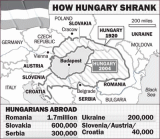 One thousand years of nation building successfully delineated groups based on culture, religion, geography, and other attributes to create the countries with which we are so familiar. While some Western European nations would continue power struggles and princely battles and civil wars, Hungary, founded in 896, was a peaceful multi-ethnic state for a 1000 years and her borders were virtually unchanged. Until 1920... One thousand years of nation building successfully delineated groups based on culture, religion, geography, and other attributes to create the countries with which we are so familiar. While some Western European nations would continue power struggles and princely battles and civil wars, Hungary, founded in 896, was a peaceful multi-ethnic state for a 1000 years and her borders were virtually unchanged. Until 1920...
The Treaty of Trianon in 1920... in the aftermath of WWI, was extremely harsh on Hungary and unjustifiably one-sided. The resulting "treaty" lost Hungary an unprecedented 2/3 of her territory, and 1/2 of her total population or 1/3 of her Hungarian-speaking population. Add to this the loss of up to 90% of vast natural resources, industry, railways, and other infrastructure. The clear winner of the land grab, was Rumania, who, established only 60 years earlier, more than doubled in size overnight.
Ethnic Distribution in the Kingdom of Hungary in 1910 (Hungarians shown in red)
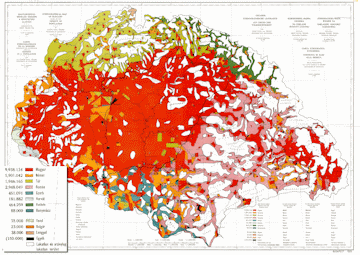
[download extra large image 4962x3509]
[download large image 1000x707]
Hungarian populations declined significantly after forced removals such as the Benes Decrees and other pograms, the effects of WWI, and Trianon in 1920. With continued pressure and discriminative policies such as the 2009 Slovak Language Law, this trend continued over the past 90 years.
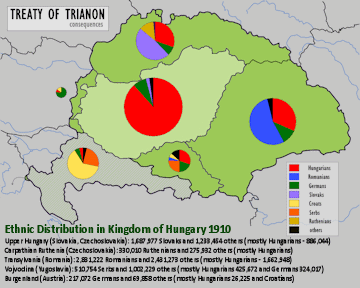
- In Upper Hungary (awarded to Slovakia, Czechoslovakia): 1,687,977 Slovaks and 1,233,454 others (mostly Hungarians - 886,044, Germans, Ruthenians and Roma) [according to the 1921 census, however, there were 1,941,942 Slovaks and 1,058,928 others]
- In Carpathian Ruthenia (awarded to Czechoslovakia): 330,010 Ruthenians and 275,932 others (mostly Hungarians, Germans, Romanians, and Slovaks)
- In Transylvania (awarded to Romania): 2,831,222 Romanians (53.8%) and 2,431,273 others (mostly Hungarians - 1,662,948 (31.6%) and Germans - 563,087 (10.7%)). The 1919 and 1920 Transylvanian censuses indicate a greater percentage of Romanians (57.1%/57.3%) and a smaller Hungarian minority (26.5%/25.5%)
- In Vojvodina 510,754 Serbs and 1,002,229 others (mostly Hungarians 425,672 and Germans 324,017)
- In Vojvodina and Croatia-Slavonia combined (awarded to Yugoslavia): 2,756,000 Croats and Serbs and 1,366,000 others (mostly Hungarians and Germans)
- In Burgenland (awarded to Austria): 217,072 Germans and 69,858 others (mainly Croatian and Hungarian)
[read more on the Treaty of Trianon]
AHF Statements on Trianon:
AHF Articles on Rumania:
 You will need the free Adobe Reader to open the following files. Click the image to download. You will need the free Adobe Reader to open the following files. Click the image to download.
Articles and Essays by AHF Members
- "NATO Enlargement" by Frank Koszorus Jr. March 29, 2004
Remarks on the Occasion of the Enlargement of NATO, Corcoran Gallery of Art, Washington, D.C. [download]
---
- "Nato Enlargement And Minority Rights: Prerequisites To Security" by Frank Koszorus, Jr., April 2003
A memorandum that was submitted to Robert A. Bradtke, Deputy Assistant Secretary for European and Eurasian Affairs, and Heather A. Conley, Deputy Assistant Secretary for European and Eurasian Affairs during a roundtable discussion on "NATO Enlargement and the Current State of the Trans-Atlantic Alliance." This submission follows several other intiatives, including submissions to Lord Roberston, Secretary General of NATO. [download]
---
- “Nato Enlargement: Promoting Western Values, Strengthening The Alliance” by Frank Koszorus, Jr., April 29, 2003
A Statement Before The United States Senate Committee On Foreign Relations.
[download]
---
- "U.S. Senate Unanimously Ratifies Nato Treaty; Senators Raise Rights Of Minorities: Federation Supports Efforts Aimed At Encouraging Romania And Slovakia To Respect Rights Of Hungarian Minorities And Restore Communal Properties" - Press Release by Zoltan Bagdy, May 9, 2003 [download]
Congressional Resolutions and Records
- H.RES 191 - A RESOLUTION urging the "prompt and fair restitution of church properties by Romania and Slovakia - TOM LANTOS / TOM TANCREDO (April 6th 2005) in the House of Representatives [download]
- A RESOLUTION REGARDING THE ISSUE OF TRANSYLVANIAN HUNGARIANS -- HON. DONALD E. `BUZ' LUKENS (Extension of Remarks - February 26, 1990) in the House of Representatives [download]
- VIOLENCE IN TRANSYLVANIA -- HON. DON RITTER (Extension of Remarks - March 22, 1990) in the House of Representatives [download]
- Transylvanian Monitor #14: Property Restitution.
Join online!

|




